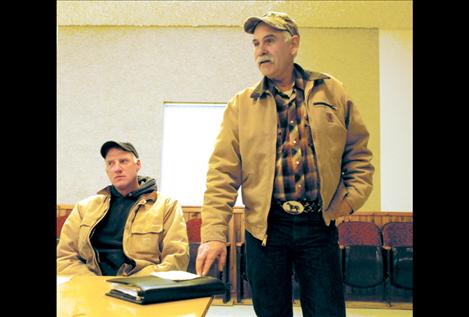Irrigation candidates answer questions
Hey savvy news reader! Thanks for choosing local.
You are now reading
1 of 3 free articles.
LONE PINE — At a regular meeting of the Lone Pine and Camas irrigators, each candidate for Flathead Irrigation District 4 trustee had 10 minutes to field questions from the audience.
Susan Lake and Shane Orien are running for the position held by Paul Hunsucker, who is vacating his seat.
Lake, of Lake’s Glacier View Farm in Ronan, said they irrigate with well water and have no secretarial water rights. She said it’s important to get involved, know the issues and know how everybody else feels.
Orien, a rancher, said he has nothing to gain and stands opposite Lake on most issues.
Irrigator Ted Hein asked how familiar the candidates were with the Camas area.
Orien said not at all, and Lake said she was studying it, but that the issues were different from Ronan’s, since farmers in Lone Pine and Camas use supplemental, or spill, water.
Hein also asked how each candidate would vote on the Flathead Indian Irrigation Project water use agreement.
Lake said, “For,” and Orien said, “Against.”
Another irrigator noted the area has off- reservation water storage and asked the candidates whether they were willing to give up rights to that water.
“I would fight for those rights,” Orien said.
“It’s my understanding with off-the-reservation water that’s it’s reserved for irrigators,” Lake said.
Gordon Wind, project manager of the Flathead Indian Irrigation Project, said as far as he knew, water in Little Bitterroot and Hubbard Reservoir had not been given away.
Lake said the cooperative management entity had had done a much better job than the Bureau of Indian Affairs in managing FIIP.
“If the compact goes away, your water service is less valuable and more expensive,” she said.
Orien answered, “I want to see those numbers before we ever sign anything.”
Audience members had comments about in-stream flows and individual water rights that go with their land.
Lake noted she and her husband had individual water rights, not secretarial rights, and would have some protection from the Flathead Joint Board of Control.
The Hellgate Treaty of 1855, negotiated by Isaac Stevens, the territorial governor of Washington, provided, among other things, “The exclusive right of taking fish in all the streams running through or bordering the reservation is further secured to said Indians; as also the right of taking fish at all usual and accustomed places ... together with the privilege of hunting, gathering roots and berries...”
This part of the treaty explained claims for off-reservation water.
Lake said the minimum in-stream flows won’t increase until improvements are made on the FIIP. She did not foresee changes to how the water project is run for quite some time.
Saying he dealt in “black and white,” Orien said he wanted to read, see and hear it (the proposed irrigation agreement) before he drew any conclusions.
Lake was also questioned about irrigating with wells.
FIIP water was never available where the use wells for irrigation, and those wells are classified as water for irrigation only. The newer wells are measured three times a year.
“Somebody said we cut a sweet deal with the tribe, but the sweet deal is in the compact. Water wells will be grandfathered in,” she explained.
Former Sanders County Commissioner J. Gail Patton commented that any well that produces more than 100 gallon per minute must go through the state.
Lake also added that the unitary membership board is not a tribal board, it is a state and tribal board.
The UMB is the management board suggested in the water compact, consisting of two tribal appointees, two State of Montana appointees and one person selected by the other four.
Mail-in ballots for irrigation, school and fire elections are due May 7.
After the candidates spoke, the irrigators set their quote at .65 acre feet and elected officers.
















